How do I know if we're on the right track?
May 02, 2023
Every kid has meltdowns. Every parent yells. How do you know if you're on the right track?
Especially when you feel like your child's behavior might be *normal*, it's hard to know when to reach out without feeling like you're overreacting.
And if you've already done a lot of work on your parenting, how can you know when something needs to change?
IN THIS EPISODE, I SHARE...
- When to come to conclusions (and when not to)
- Questions to ask yourself to gain perspective
- The most important indicator to consider
DON'T MISS:
- How my intake process differs from other professionals
// CONNECT WITH DANIELLE //
IG: @parent_wholeheartedly
APPLY: parentingwholeheartedly.com/apply
FREE CONSULT: wholeheartedly.as.me/call
*FREE* MASTERCLASS: Learn how to CONFIDENTLY parent your strong-willed child WITHOUT threats, bribes or giving in altogether so you can BREAK FREE of power struggles + guilt
www.parentingwholeheartedly.com/unapologetic
TRANSCRIPT
Danielle Bettmann 0:05
Ever feel like you suck at this job? Motherhood I mean? have too much anxiety. Not enough patience. Too much yelling, not enough play. There's no manual, no village, no guarantees. The stakes are high. We want so badly to get it right. This is survival mode. We're just trying to make it to bedtime. So if you're full of mom guilt, your temper scares you. You feel like you're screwing everything up, and you're afraid to admit any of those things out loud. This podcast is for you.
Danielle Bettmann 0:39
This is Failing Motherhood. I'm Danielle Bettmann. And each week we'll chat with a mom ready to be real. Sharing her insecurities, her fears, your failures and her wins. We do not have it all figured out. That's not the goal. The goal is to remind you, you are the mom your kids need. They need what you have. You are good enough. And you're not alone. I hope you pop in earbuds somehow sneak away and get ready to hear some hope from the trenches.
Danielle Bettmann 1:15
Hey, it's Danielle. I am so glad you're here. If you missed last week's Game Changer free training. Oh my gosh, it was so much fun. All of us were commiserating having so much chat back and forth on that Zoom call. And I got a lot of feedback from parents who tried the tool and are having success with it to their shock and surprise, which I love. And I'm so proud of them for implementing things right away. So if you were there, thank you. Thank you, thank you for investing that time in your family, you're in the right place. And I'm so glad you're here.
Danielle Bettmann 1:53
So in today's episode, I've been thinking about this episode for a while. And I ended up having a session last week with some of my graduate clients. And they brought it up then. And so I was like, Okay, this is what we have to talk about this week on the podcast. And it's this concept of how bad is bad enough? Or if we're not supposed to use our kids behavior as a report card, then like, what do we use? Like? How do we know where things are at? And if we need help? And if they're bad enough? I don't know. Is that even the question we ask, right. So this particular family I met with last week, they I worked with them one on one for four months in the fall of 2021, I believe. And over 2022 Every month, we have met once a month. And they have chosen to be extra credit parents and carve out an hour every single month to stay in maintenance mode and stay on track where even though they're in two different places at work, they hop on the call with me and get ahead of upcoming transitions. Try to be responsive to some of the things that are happening in their home. And I love working with parents like this because they're so mindful, so intentional, of being the best parents that can be there, I'm being honest. And so as they were walking through the pre session questionnaire that they respond to, so that we can make the most of our time together.
Danielle Bettmann 3:30
On the call, the dad said, Hey, we had a harder time thinking about what we're currently struggling with for this past month or for this upcoming month. So we wanted to ask, how do we monitor our progress? How do we know if we're on the right track? Like, when do we know if something needs to change? Because of course, we still have the occasional flare ups of sibling rivalry or a really bad meltdown. You know, that's the exception to the rule of bedtime. So how do we kind of track things and keep on track moving forward? And it was such a good question because it shows how much they care how much they're thinking about this, and how much it means to them. Right? So already, if you're asking questions like that... kudos, because the reality is, every family has bad days. Every kid has meltdowns. Every kid fights with their sibling. That's an inherent issue with that relationship. Every kid it's their job in certain seasons to push the boundaries. Say no back to you find their voice find the line. So how do you know what's any different about what your family is going through compared to a neighbor or a friend or one of my clients? Like what matters the most? Is it just like the number of meltdowns or you know like what are we looking at here?
Danielle Bettmann 5:00
And this reminds me, did you know, alcoholics have to jump through an extensive number of hoops to prove that they have the medical necessity, that their withdrawal symptoms will be bad enough that they need to be monitored in order to actually qualify for the medical necessity for like a rehab program.
Danielle Bettmann 5:47
So there's a similar level of complexity and confusion, and getting help for your child or for your parenting. And I want to be able to clear up some of that, hopefully, on this episode.
Danielle Bettmann 6:00
So if you were to bring up concerns to your pediatrician, or to a mental health professional, or someone in that fields, they are primarily going to ask you and focus on the circumstances, right, they're going to have symptoms on a list, they're going to want to make sure that you're seeing the struggles translate between two or more environments, and that it's impacting your child's ability to function in some way. Right. And they're going to ask you about yesterday and the day before, or kind of break down exactly what you're seeing and focus on the circumstances. And, of course, that is necessary for a lot of reasons. And there are a few red flags, when it comes to the degree of or an intensity of aggression that you are seeing on a daily basis, the length and frequency of the meltdowns that they experience.
Danielle Bettmann 8:20
All growth in life is two steps forward, one step back, and our brain will fixate on the remaining problems that we see. But our kids and our parenting can't be defined by only the top 2% of the hardest moments. But yet we fixate on those and in those bad moments, we tend to jump to conclusions. This is getting worse, I can't handle this, they are going to drop out of school one day and join again.
Danielle Bettmann 8:51
You know how they say you shouldn't quit your job on the worst day. Because in general, that's not the most informed way of thinking that's not going to get you the best conclusion of the clearest picture of what you need to do.
Danielle Bettmann 9:06
And in general, that's true, because when you and they feel better, you do better. Simple as that. No need to jump to rash conclusions.
Danielle Bettmann 9:48
Overall, do you feel optimistic? Can you see the strides that are being made over time over the last month or over the last couple months? Do you have more tools in your back pocket to try and more to give towards this problem? Is there potential for improvement? With a new plan you already have? Or is this just a case of hitting reset?
Danielle Bettmann 10:16
Right? That's one side of things. Or ...
Danielle Bettmann 10:23
Do you feel like the overall trajectory of things is on the decline, that more of the bad is outweighing the good, that you feel like you've tried everything you can think of, and more, don't really have much else to give. You're feeling overall, more and more confused, or lost, or frustrated, or defeated, or hopeless. And truly, when it comes down to it, you don't know what else to do. Because you have nothing else to give. When that's the case, no matter how many incidents or outbursts or lack thereof of there is on a daily basis, it's time to seek outside help.
Danielle Bettmann 11:45
There are worse things than overreacting, if that's your biggest fear. There aren't many downsides to taking parenting seriously, especially when you have a mentor and people to process with and work through these things with support.
Danielle Bettmann 12:05
What I want you to know is that having a strong-willed child is not a death sentence, that your days are destined to be riddled with meltdowns and power struggles from here on out. Because that's the circumstances. That's the developmentally appropriate spectrum.
Danielle Bettmann 12:27
Because my clients typically go days without meltdowns, and they no longer get to a place of them being at that point of no return. That's what you should hold as the baseline. You either already are there, or you're working towards it. And you either have the tools to work towards it or you don't. And neither way is wrong or bad. But you need that awareness to be able to inform your approach ongoing.
Danielle Bettmann 13:02
So I want to share as a wrap up an example. Because a family just graduated from my program, Wholeheartedly CALM the Ross family. And they shared their little testimonial form as they graduated, before you hopping on their live call and kind of talking to everybody again and sharing what they've learned. But Jaclyn said, parenting used to feel exhausting, overwhelming, confusing, and impossible. And so hard.
Danielle Bettmann 13:33
And now it feels much more fun and rewarding. I feel so much more confident and consistent and knowing what to do and how to handle these big feelings. I've been yelling, screaming and losing my patience, way less. I'm able to have fun and be silly in difficult moments. Her daughter has had way less meltdowns, and they're much shorter. She doesn't take them personally anymore, and she can give herself grace.
Danielle Bettmann 16:29
Thanks for coming on this journey with me. I believe in you, and I'm cheering you on.



